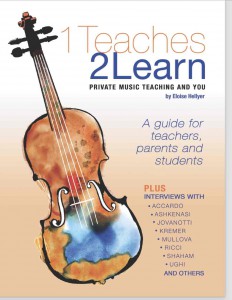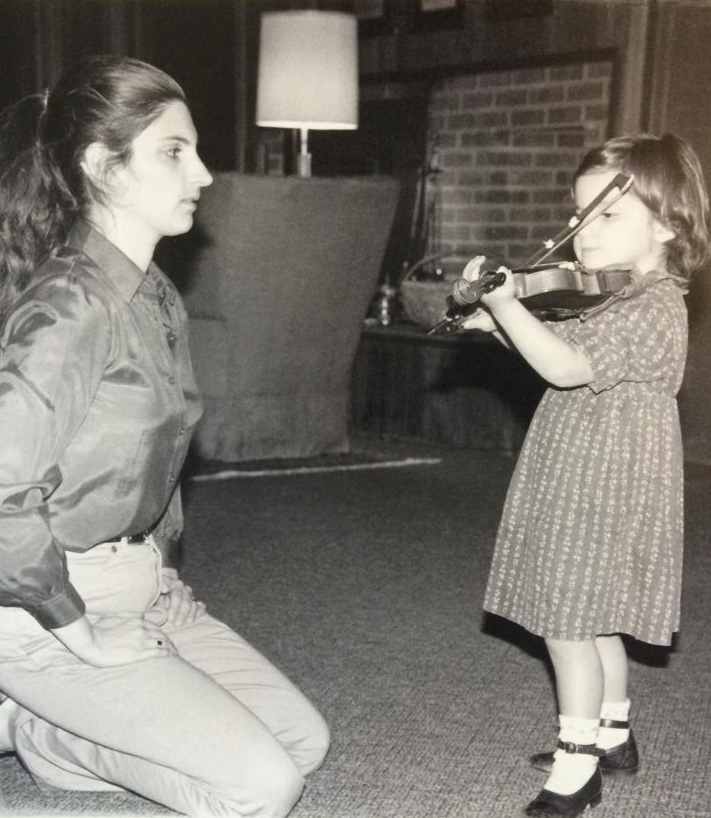Another Useful Way to Include Parents in the Lesson
Recently an ex-student, now a teacher herself, asked my advice about one of her students. Before replying, I asked her what kind of work her student’s parents did. Her reply surprised me. “Oh, no, I never ask the parents what they do for a living. The less I know about them, the better.”
My young friend apparently thought that a parent is supposed to sit there, take notes without saying a word and shouldn’t be otherwise involved in the lesson at all.
Why did I find this surprising? Because, not only in my opinion but in my experience, it’s a big mistake. The more I know about the parents, the easier it is for me to teach their child and, even more importantly, the easier it is for me to help the parents help their child. Why? I have four objectives.
Objective number one is to build up the parents in the eyes of their children. How do I do this? I convince them that their parents are really smart people, which of course they are. This often comes as a surprise to most children as they usually never see their parents at work and have no idea of the complexity of their jobs and the hard work they had to put in to achieve and keep competence in their chosen professions.
Why do I do this? For a very practical reason: I need the parents to help their children practice. The more the parents help, the better the students do. That’s a given. However, students often think that their parents, especially those who know nothing about music (and even those who do), were put on this earth for the sole purpose of annoying their offspring with making them do useless things like washing their hands before eating, etc.
One thing that most of us adults and teachers need to remember is to think like children. You have to get into their heads in order to understand what will make an impression on them. One of the most important things that we adults forget is that children tend to think their parents (and teachers) came to this earth fully formed, much like Athena from Zeus’ really bad migraine. They have no idea of the amount and kind of daily, tedious and often repetitive slog most of us have had to put in to get where we are. They see us all as being born fully formed college professors, doctors, lawyers, car mechanics, teachers, plumbers, architects, writers, bakers, travel wholesalers, policemen, army colonels, dancers, farmers, stone quarry supervisors, engineers, seamstresses, jewelers, musicians, actors, car salesmen, housewives and househusbands, to name just a few of my parents’ and ex-parents’ professions. Perhaps my students’ parents have told them how hard they had to work to prepare for their jobs, but most children only listen with half an ear, if at all, to their parents or grandparents talking about how things were in their youth.
However, when I, a completely extraneous person, get into the act, things start changing.
Here’s an example. One little girl is the child of two doctors, one an oncologist and the other an ER doctor. One day I could tell that Linda, not her real name, was getting bored because I was asking her to repeat something several times to make sure she got it right. I stopped what we were doing and asked her if she were indeed getting bored by having to repeat the same thing over and over. She replied that yes, it was kind of boring and she didn’t really want to do it. So what did I do? Give a lecture about practice, repetitions, the patience being necessary to play the violin well, all of which would have done no good whatsoever? Certainly not. I asked her if she knew how many times her mother had to practice her stitch work technique on oranges so she could then sew up injured people. Linda looked surprised and turned around to her mother, who perked up, looked very pleased to be included and said, “So many hours, I couldn’t count them—on pigskins, too!” The shock on that child’s face when it hit home that her mother had to do lots of mind-numbing repetitions to learn something mundane but essential to her exalted profession was worth a thousand explanations and lectures, which she wouldn’t have listened to anyway. It brought home several very important points that she had never considered:
- She is not alone.
- The violin is not the only thing that needs to be practiced in life.
- That she can have the patience, as her parents did, to do repetitious work which will surely serve her later in life.
- And that it’s worth doing.
Score one for our side.
I do this with every single profession that parents have—and I have a varied collection of parents. I use specific and precise examples of every one of my parents’ professions which I couldn’t possibly do if I didn’t know what they were. Here are some more examples:
Lawyer: “Ask your father how he has to plan meticulously his preparation for a court case which involves hours and hours of research and lots of thought. Go ahead and ask him now what happens if he waits until the last second, as you are doing to decide how you want to interpret your recital piece, or counts on inspiration to do it for him?”
Engineer: “Your mother has a tremendous responsibility to make sure her calculations are precise or a bridge falls down, people die and someone (most likely your mother) winds up in jail. Ask your mother right now how many times she had to practice doing such calculations in college and having done them, endlessly check them over? Don’t you think you could do with a little more precision in your practicing? It’s in your DNA . . .”
Cook: “Too much salt is just as bad as too little, as your father can tell you. A good cook also knows exactly what dish he wants to come out of the kitchen. Thus, you have to know exactly what sound you want so you can decide how you dose your bow. Turn around right this second and ask your father how much thought, planning and practice go into creating menus. You might also ask him how many thousands of onions he had to peel and chop when he first started out.”
These are only three examples. So far, I have been able to think of one for every single profession of the many and varied I have encountered in my long career.
Of course, when I get the parents to confirm whatever I’m saying, it serves my second objective: to actively involve them in the lesson. Many of them are tired, stressed and otherwise have a lot on their minds. When I call them into play like this, it encourages them to pay more attention as, understandably, sometimes their minds wander. This way, however, I know they’re paying attention. They also enjoy being given some importance and enhanced stature in the eyes of their children.
Which brings me to my third objective: to help parents understand that I am really on their side and think its important that their children understand how hard they had to work to achieve whatever they have achieved and that they weren’t born the way their children see them now. This helps their children realize that whatever they are going through to learn the violin is what anyone has to go through to learn to do anything well, and that their parents have done this, much to the eternal surprise of these children when that fact finally sinks in.
Then there is the fourth objective: to make sure that students and parents understand that learning to play the violin is an excellent preparation for any of the vicissitudes that life will throw at you; learning a musical instrument will give you both discipline and the ability to break down problems and solve them (what I call the “habit of success”), which are useful—even essential—tools that can be applied to anything, no matter what you do later in life. This fact also helps to encourage parents to take an even more active interest in their child’s music education.
The more respect children have for what their parents do for a living, or rather had to do to be able to practice their profession, then the more respect they will have for their parents in general. The more respect they have for their parents, the more likely they are to listen to them.
After all, we teachers are not as important to our students as their parents are. It’s our job to give direction and support and then get out of the way.
That’s in all of our best interests, isn’t it?
Post author: Eloise Hellyer
Share this:
Buy it on www.sharmusic.com - eBook format, avaliable worldwide, paperback in North America
COPYRIGHT
ABOUT
A music teacher’s thoughts and observations on the teaching and the study of a musical instrument, hoping to be of help to parents, students and teachers.
PHOTO
AWARDED TOP 25 VIOLIN BLOG
CATEGORIES
TAGS
ARCHIVES
-
Agosto 2022
Agosto 2023
Agosto 2024
April 2015
April 2016
April 2017
April 2019
April 2020
Aprile 2022
Aprile 2023
Aprile 2024
August 2014
August 2015
August 2016
August 2017
August 2018
August 2019
August 2021
December 2014
December 2015
December 2016
December 2017
December 2018
December 2019
December 2020
Dicembre 2022
Dicembre 2023
Dicembre 2024
Febbraio 2022
Febbraio 2023
Febbraio 2024
February 2015
February 2016
February 2018
February 2019
February 2020
February 2021
Gennaio 2022
Gennaio 2023
Gennaio 2024
Giugno 2022
Giugno 2022
Giugno 2023
Giugno 2024
January 2015
January 2016
January 2017
January 2018
January 2019
January 2020
July 2015
July 2017
July 2019
June 2016
June 2017
June 2018
June 2019
June 2020
June 2021
Luglio 2022
Luglio 2023
Luglio 2024
Maggio 2022
Maggio 2023
Maggio 2024
March 2015
March 2016
March 2017
March 2018
March 2019
March 2020
March 2021
Marzo 2022
Marzo 2023
Marzo 2024
May 2015
May 2016
May 2018
May 2019
May 2020
November 2014
November 2015
November 2016
November 2017
November 2018
November 2019
November 2021
Novembre 2022
Novembre 2023
Novembre 2024
October 2014
October 2015
October 2017
October 2018
October 2019
October 2020
October 2021
Ottobre 2022
Ottobre 2023
Ottobre 2024
September 2014
September 2015
September 2016
September 2018
September 2019
September 2020
September 2021
Settembre 2022
Settembre 2023
Settembre 2024
RECENT POSTS
Terry G and Me, or Terry Gilliam on Where (or What) Practicing the Piano Will Get You…
The Teaching We Don’t Do Is More Important Than We Think
Overwhelmingness or What Teaching and Motherhood* Have in Common
Cellphone Serenity
How to Build Your Reputation – the Kind You Want
Desperate Times, Desperate Measures. Or How to Deal With Your Strong-Willed Stubborn Student and Survive
“Why Does My Teacher Get So Frustrated?” Letter to a Perplexed Student
Mount Rush-no-more….And How to Get There
Realizzato con VelociBuilder - Another Project By: Marketing:Start! - Privacy Policy




